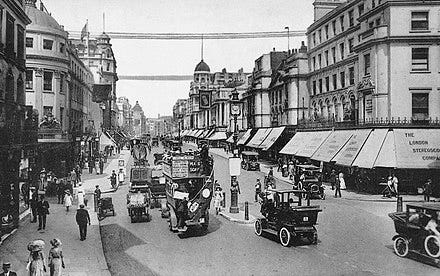Detective Cooper and the case of the missing nurse
Charles Cooper was one of the 'Big Five' senior officers at Scotland Yard, but resigned to establish his Regent Street detective agency
Last week, I wrote about the partnership between former Met detectives James Chandler and Walter Thomas Selby. This week, I'm looking at another agency, this one co-staffed by Walter's son, Walter William Selby. Walter followed his father's footsteps, joining the Metropolitan Police and being, by 1921, a police sergeant and then divisional inspector. When well-known CID Superintendent Charles Cooper resigned in 1932, he decided to form his own detective agency. Unlike James Chandler, though, he wanted the agency to be under his own name, Coopers Ltd, and so he took on Walter W Selby as his 'first assistant' in his agency (in 1939, Selby described himself solely as an inspector with the Metropolitan Police, although this could be a reference to his police pensioner status, but he does not seem to have been working as a private detective by this point).
Charles Cooper, born a farmer’s son in Hampshire, and now aged 60, had planned his resignation and new career well, knowing that when the news of the resignation was made public, he would receive a lot of publicity, being so senior and so well known. He therefore made clear to the press that he was leaving to become a private detective, and duly received lots of coverage for his fledgling detective agency. He found office premises at Triumph House on Regent Street in London, and did not have to wait long for his first commission.
Regent Street, home to Coopers, Ltd private detective agency
This was a missing person case. An 18 year old trainee nurse had gone missing from her work - a nursing home in Highbury - and although her family immediately reported the matter to the Metropolitan Police, they also contacted Cooper's agency and asked him to investigate.
The nurse was Gwyneth May Humphreys. She was from Broughton, near Wrexham, the youngest child of coal miner William Humphreys and his wife Mary Jane. The Humphreys had had six children, two of whom had died before their first birthdays - including their only son, Ivor. Gwyneth was born six years after Ivor's death; her eldest sister Alice was 13 years older than her, and other sister Dora was six years older. Gwyneth was therefore the baby of the family.
By 1932, Dora Humphreys had got married, and she and her husband Henry were on holiday with her parents in Wrexham. Eldest sister Alice had moved to Fitzroy Square in London. But when Gwyneth told her family that she too planned to moved to London, she was met with concern. Dora even warned her little sister 'of the dangers of the London streets.' As any 18 year old would do, Gwyneth ignored her family's worries, and moved to London to start her career as a nurse. She had only been there four months when she went missing.
It was Thursday 21 July 1932 when she was seen leaving work - then nothing until the following day, when Alice Humphreys received a letter, with a postmark indicating that it had been posted at Victoria Dock in East London. In it, she insisted that she was all right; one report stated that she had written, "Tell mummy to keep on loving me, but don't try to find me." Another report insisted the letter read,
"Do not worry about me. Some day I will come back again. Give my love to mother."
The police and Charles Cooper were now notified, presumably by London-based Alice Humphreys. Alice provided a description of her sister - five feet four, well built, with brown eyes and hair. Witness statements were taken: someone had seen Gwyneth leaving work with colleagues, another that she had got into a car driven by a man wearing dark, horn-rimmed glasses. Cooper said he was sure this woman in the car was Gwyneth.
Sister Dora said she was sure Gwyneth had been kidnapped - and Charles Cooper, whose police career had seen him travel to the US, Canada and West Africa, and who had helped bring Dr Crippen to court, now tried to find this young nurse. However, just a week later, she was found in the East End, safe and well, and the story went quiet.
Why Gwyneth had vanished, where she was over the week of her disappearance, and the reason for her letter is not known. Certainly, Gwyneth was fine, and was reunited with her family, for she married two years later, in her hometown. But for a story that was greeted initially with huge publicity as being Charles Cooper's first major case as a private detective, it ended with more of a whimper. It was not one of the murder cases that he was used to investigating as a police detective, but more likely the story of a young Welsh woman experiencing her first bit of independence as a woman in London, and making the most of it.




